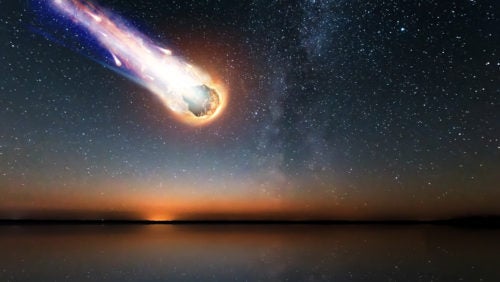Professor David Koplow on Planetary Defense: The Asteroid Problem
June 4, 2019

As an asteroid buzzes by our planet in early June, Professor David Koplow is working on the problem — as a consultant to NASA on a topic identified as “Planetary Defense.”
The question seems like science fiction or a classic video game: What should be done — legally, of course — if we discover some day that there is a large asteroid on a collision course with Earth?
As an asteroid buzzes by our planet in early June, Professor David Koplow is working on the problem — as a consultant to NASA on a topic identified as “Planetary Defense.”
“NASA has been concerned about this problem for some time, but only in the last few years has it gotten enough attention, both in this country and internationally,” says Koplow, who works with officials at NASA’s counterpart space agencies in Europe, Mexico, Russia, China and elsewhere to figure out a solution. “The international group — called the Space Mission Planning Advisory Group (SMPAG, pronounced ‘samepage’) — decided that although the issue of what to do with an asteroid is 99.99 percent a science and technology problem, there are some aspects that are legal problems as well. So they established a subgroup of about a dozen international lawyers to advise them.”
Exploration
The general counsel’s office of NASA, needing to contribute an international lawyer to the group on a part-time basis, reached out to Koplow. This longtime Georgetown Law professor, whose areas of expertise include public international law, national security law and arms control, now gets to blend all these fields in a unique way, since the answer to “what might be done” could involve a nuclear explosion to divert the asteroid. “My work on the law of outer space has been mostly about weapons in space,” he said. “For, me, it was a chance to explore a new area, but not so totally different from what I’ve done.”
The international lawyers group has been meeting over the last three years to draft a report that identifies legal issues and solutions, Koplow said. And they’ve presented law-related panels at conferences of other experts like astronomers. Koplow and two other international lawyers presented at a Planetary Defense Conference, comprised of mostly scientists, at the University of Maryland in late April. The most active lawyers have been from Austria, France, and the United States, as well as those involved in the European space agency, Koplow said.
“There are two big clusters of legal issues: one has to do with the possible use of a nuclear explosion, because there are treaties that specifically forbid the use of nuclear weapons in outer space. So you have to find some way around that prohibition, if that turns out to be the technique,” he explains. “The other big cluster of legal issues has to do with legal liability if something goes wrong. Suppose there’s an asteroid coming, and we try to deflect it, and we are partially successful. It changes trajectory somewhat and hits the Earth at a different place. If it would have hit Country A if you did nothing, but now it hits Country B, Country A is happy, but Country B is unhappy, and there is a treaty that says if your space activity causes damage on Earth, you have absolute liability. That liability could be enormous, so that potential legal exposure would deter me from undertaking that activity.”
Challenge
While the interdisciplinary, scientific nature of planetary defense is unique, the question is international law as usual in some ways. “Working with lawyers from other legal cultures whose countries are subject to different rules and treaties…it’s a challenge to find a consensus.” And it involves national security: Koplow has previously worked at the Department of Defense, as Special Counsel for Arms Control to the General Counsel (2009-2011) and as Deputy General Counsel for International Affairs (1997-1999); and at the U.S. Arms Control and Disarmament Agency as Attorney-Advisor and Special Assistant to the Director (1978-1981).
Koplow recently completed an article for the UCLA Journal of International Law and Foreign Affairs on the nuclear aspect.
Recommendations, as 2012 KZ41 flies by the Earth? “You could amend the treaties, or you could withdraw from the treaties, or write new treaties — but the best solution is to have the UN Security Council adopt a resolution to create new law that would supersede prior treaties,” he said. “We propose that as the most expeditious and finely tailored way to deal with both of these kinds of legal problems.”